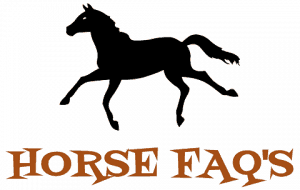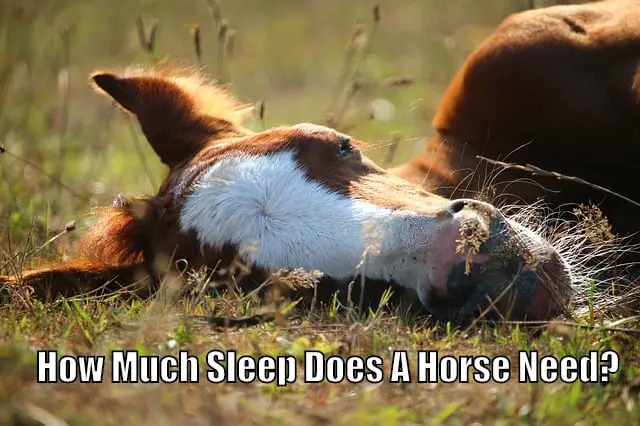When it comes to animals, it is never easy for us to determine how much sleep these animals are getting. We couldn’t even know whether they are having enough sleep or not unless we truly monitor them every hour of the day, right? Equines are the types that do not have a definitive sleeping pattern, and these animals tend to sleep more frequently than us, humans. These horses are considered to be polyphasic type since they cannot be classified as nocturnal or diurnals. In other words, they sleep whenever they want to, wherever they are and in whatever position they liked to.
Scientifically speaking, humans need to have at least eight hours of sleep to fully regenerate our bodily systems. But for horses, have you ever wondered how much sleep do they need to fully recover and gain enough energy? Are you sure that your horse is not sleep-deprived? These are the questions that we would like to answer. Indeed, equine’s sleeping requirements are one of the unusual types and here are some of the things that you wish you may have known and learned earlier about these unique horses.
So how much sleep do horses need?
Horses sleep way different than humans. As what I have told you earlier, they sleep frequently but with shorter periods. They usually sleep and rest any time of the day, but the actual sleep that they can have does not occur on a night time, which is the exact opposite of what humans do. In general, the average number of hours needed by horses for sleeping varies and depends on the age of the horse. Also, sleeping patterns of adult horses are somewhat different from the younger ones’. Adult or mature horses can have 3 to 5 hours sleep in a 24-hour period. Meanwhile, younger horses and foals tend to sleep more than the mature ones. In general, there are few factors that might affect the length and frequency of a horse’s sleep, and they are diet, temperature and environment, workload, and gestation.
How do these factors affect a horse’s sleeping pattern?
- Diet. This is one of the major causes of sleeping pattern alterations among different types of horses as well as in other types of ruminants. The type and the amount of food that they eat contributes to the regulation of their circadian rhythm. Research has shown that horses that have sleep problems or undergoing sleep deprivations are the ones that have poor diet quality and with higher rates of obesity.
- Temperature and environment. Horses are very adaptive to temperature and the type of environment that they are in. However, in both high and low temperature, horses should have a balanced heat loss and heat gain otherwise, they won’t be able to function normally and one of the factors being affected by it is through their sleeping patterns. Your horses must be given comfort in order to avoid irritability. A sudden change of temperature might lead to some equine problems.
- Workload. Horses are just like humans in this very factor. A physically and mentally demanding day needs to be ended by a good sleep for horses, too. Also, horses can perform or work more efficiently with enough rest, sleep and energy.
- Gestation. A pregnant mare should have enough rest and sleep for the foal. Since their pregnancy is one really crucial journey, the way how a mare eats and sleeps must take into consider. Too much food and sleep for pregnant mares might cause to abortion and other serious problems like having difficulties in foaling with narrowed birth canal due to excessive fat deposits.
Is there a difference on how adult horses sleep than how younger ones do?
As horses become more matured and adult, they gain much weight and they tend to increase in their size gradually. With this, adult horses often sleep and rest in a standing position. In this way, they could be able to rest and relax while not falling down. Since they have already gained weight, lying down could really cause an internal pressure on its organs so sleeping in this manner does not really make them fully comfortable. However, if ever you got a very nice and cozy place for your horses and they really feel at home and comfortable on that area, some horses prefer to lie down while sleeping. Indeed, it is really important to provide nice shelter for your horses so they can have a good rest and sleep.
Meanwhile, baby horses or foals’ sleeping position is somewhat different from the adult ones. They tend to have frequent naps and they really like to spend almost half of the day sleeping. However, as soon as they reach their third month, this kind of sleeping habit will eventually change until their habit becomes similar to an adult horse’.
Other fun facts about horses’ sleeping habit:
- While horses are in a very deep sleep, their ears are relaxed, their eyes are closed and their lips may droop.
- Horses often lie down during spring but they tend to spend less time on the ground during cold and snowy conditions.
- However, sleeping on the ground is a lot more stressful for horses than the standing sleeping position.
Related Questions:
- Aside from the internal organ pressure that they could have when sleeping on the ground, what could be the other reason why horses tend to sleep above ground or in a very standing position?
Yes, it is true that horses usually feel a lot less comfortable when sleeping on the ground due to the stated reason above. Another reason for this: sleeping while standing is a form of environmental adaptation that they acquired as a prey in the wild. Horses didn’t like being on the ground because it makes them more vulnerable to predators around.
- What is stay apparatus among horses?
A stay apparatus is a group of muscles, tendons and ligaments that helps horses to remain standing on a quite long period even when they are sleeping. This group locks major joints in the horses’ limbs. To other larger animals, this group of structures can also reduce fatigue while on a standing position and tend to support the whole body of the animal.
- Do horses also need REM sleep?
Yes, horses also need REM (rapid eye movement) sleep for further brain stimulation however, they only need a very little REM sleep each day. This phase of sleep is also known as the “deep sleep” part of whole sleeping cycle.
- What happens to horses when they are on REM phase of sleep?
When horses are on the REM phase, they might move their legs while laying on their side. In this state, we can say that they are in the process of dreaming. Some horses become more relaxed while having REM on the ground that they even snore and twitch just like us.

